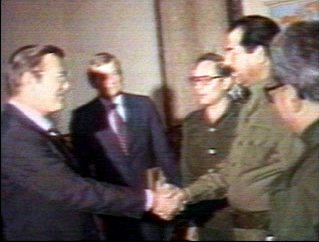There is a close relationship between petroleum and war. James A. Paul, Executive Director of the Global Policy Forum, has described this relationship very clearly in the following words:
“Modern warfare particularly depends on oil, because virtually all weapons systems rely on oil-based fuel - tanks, trucks, armored vehicles, self-propelled artillery pieces, airplanes, and naval ships. For this reason, the governments and general staffs of powerful nations seek to ensure a steady supply of oil during wartime, to fuel oil-hungry military forces in far-flung operational theaters.”
“Just as governments like the US and UK need oil companies to secure fuel for their global war-making capacity, so the oil companies need their governments to secure control over global oilfields and transportation routes. It is no accident, then, that the world’s largest oil companies are located in the world’s most powerful countries.”
“Almost all of the world’s oil-producing countries have suffered abusive, corrupt and undemocratic governments and an absence of durable development. Indonesia, Saudi Arabia, Libya, Iraq, Iran, Angola, Colombia, Venezuela, Kuwait, Mexico, Algeria - these and many other oil producers have a sad record, which includes dictatorships installed from abroad, bloody coups engineered by foreign intelligence services, militariization of government and intolerant right-wing nationalism.”
Iraq, in particular, has been the scene of a number of wars motivated by the West’s thirst for oil. During World War I, 1914-1918, the British captured the area (then known as Mesopotamia) from the Ottoman Empire after four years of bloody fighting. Although Lord Curzon denied that the British conquest of Mesopotamia was motivated by oil, there is ample evidence that British policy was indeed motivated by a desire for control of the region’s petroleum. For example, Curzon’s Cabnet colleague Sir Maurice Hankey stated in a private letter that oil was “a first-class war aim”. Furthermore, British forces continued to fight after the signing of the Murdos Armistice. In this way, they seized Mosul, the capital of a major oil-producing region, thus frustrating the plans of the French, who had been promised the area earlier in the secret Sykes-Picot Agreement.
Lord Curzon was well aware of the military importance of oil, and following the end of the First World War he remarked: “The Allied cause has floated to victory on a wave of oil”. More


No comments:
Post a Comment